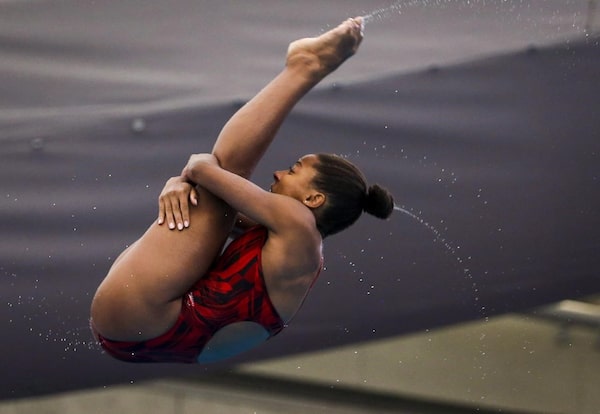
Canadian diver Jennifer Abel is looking to approach her fourth Olympic adventure with a very different attitude.The Canadian Press
Canadian diver Jennifer Abel will be on a mission in Tokyo.
From her painful experience at the Rio de Janeiro Games, where she finished just off the podium in her two events, she believes she’s learned a lot about herself and it’s that difficult learning process that will allow her to approach her fourth Olympic adventure with a very different attitude.
Accustomed to the podium on the international stage, the 29-year-old from Laval, Que., admits that she experienced something of an identity crisis when she returned from Rio.
“I found it really difficult to go back home with two fourth places,” she said. “Because I was aiming for two medals. I’m used to always coming back with a medal, whether it’s in synchro or in individual.
“I asked myself who I was if I wasn’t the Jennifer who brings back medals. It definitely took time for me to get something positive out of it. But, today, I wouldn’t change the fourth places for a medal, because I wouldn’t have done the work I’ve done in these last few years, and I wouldn’t have the same outlook I have now.”
In fact, she said the Rio Games taught her an important life lesson.
“I’m worth a lot more than an Olympic medal,” she said, laughing. “Finishing fourth is also great, it’s not always the goal you set for yourself, but I didn’t give a bad performance.”
Every four years, the spotlight shines on the Olympic athletes and, all too frequently, the success of their career is judged based on the Games’ podium. While Abel admits that the event magnifies success or failure, experience tells her that it’s not everything.
“It’s true that for someone who works very hard and who win an Olympic medal, it’s phenomenal. After Rio, I learned to look at the big picture when of my career and not only my career at the moment of three Olympic Games.”
Even though her experience in Rio hurt — and led Abel to reconsider what events she would compete in — she never considered not going to the Tokyo Games.
“I knew that I hadn’t achieved all my goals. But, at the same time, I had to decide if I wanted to compete in as many events, to continue with the synchronized event or to just concentrate on the individual. Fortunately, I continued my journey in these two events.”
Abel and her new partner, Melissa Citrini-Beaulieu, four years her younger, gave a solid performance at the World Cup in Tokyo last May to secure a silver medal in synchronized three-metre diving behind the Chinese pair of Chang Yani and Chen Yiwen.
For Abel, who won the bronze medal in synchro at the London Games in 2012 with Émilie Heymans, the result justified her decision to continue with synchro.
“It’s what I needed in 2016, after Rio, Melissa is a beautiful flower who is blossoming in a beautiful way. The two of us, we have the same work ethic. It’s really nice to have someone beside you who works just as hard, who works towards the same goals.”
While Abel has matured since her first Games in 2008 — she was 16 years old at the Beijing Olympics — she hasn’t changed her approach to competition.
“I still expect a lot from myself. I’m a perfectionist as well, my bar is set very high,” she said.
An athletic diver, Abel is an athlete who likes to innovate in her sport.
“I’m not afraid to try something new that could make me better,” she said.
She said biggest different between who she is now and who she was when she made her debut in Beijing is that she’s more stable.
“Before, I always had to prove something to myself. I have better emotional control, it’s easier to manage my emotions,” she said.
In a relationship with professional boxer David Lemieux, Abel said that being with someone who lives the same reality of high-level sport benefits both of them.
“When I come home and it hasn’t been going so well in training or competition, I have someone who can bring me back down to earth and make me see the positive side. That’s the beauty of being with someone who understands what you’re going through, because you can really support each other,” she said. “When we commit to something, the two of us, we do it 100 per cent.”
In Tokyo, unlike in the past, Abel won’t have the support of her friends and family nearby. Due to the pandemic, foreign spectators are forbidden in Japan during the games.
“I’m really disappointed by that. Because my brother, my parents, my partner already had their hotels and their tickets. I’d like to experience this with them,” she said. “But in terms of performance, it doesn’t change anything, because I’m used to going into competition without them by my side.”
Sign up for The Globe’s Olympic newsletter and follow all of the news, features and opinion in the leadup to the Summer Games in Tokyo.